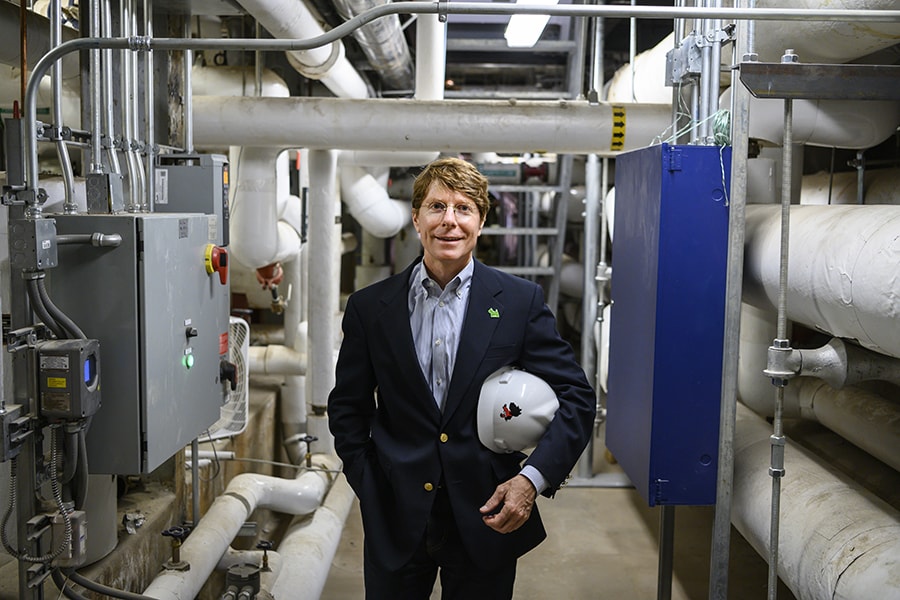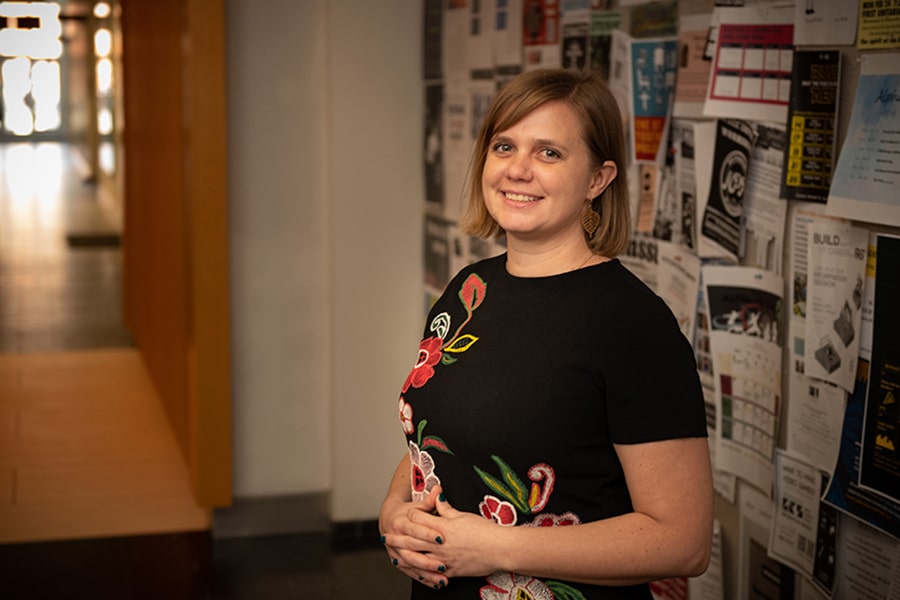CMU Completes Voluntary Review of Sustainable Development Goals
The report is a first-of-its kind by any university
Carnegie Mellon University's commitment to equity, justice and the environment is reflected in a new report released this week that catalogues activities by students, faculty and staff to advance the Sustainable Development Goals (SDGs). The Voluntary University Review is a first-of-its-kind report.
The goals are 17 global objectives designed to create a more equitable and sustainable planet by 2030. Millions of people around the world provided input on the goals, which were adopted by the international community in 2015. The commitments are reflected in CMU's own longstanding efforts on sustainability and addressing society's most pressing needs.
Provost and Chief Academic Officer James H. Garrett Jr. launched CMU's Sustainability Initiative during the UN General Assembly last September, and he made a commitment to present the Voluntary University Review during this year's gathering.
"We recognize that sustainability goes beyond environmental topics to include critical issues of equity and inclusion," Garrett said. "By using the common language of the SDGs, we can link our education, research and practices to help shape a more sustainable and equitable future for all."
Garrett will be among the speakers at a Zoom event from 1 to 2:30 p.m. on Wednesday, Sept. 16, discussing American leadership in advancing the goals. The event, which builds on last year's session in which Garrett also participated, will be hosted by the Brookings Institution and the United Nations Foundation.
Tony Pipa, a senior fellow at the Brookings Institution, congratulated CMU on its leadership.
"This work reflects the seriousness with which this institution approaches the SDGs and offers a model for its counterparts," Pipa said. "It places the global goals at the center of what it takes to be a leading university, explicitly laying out the university's strengths and opportunities for educating the world's next generation of leaders, and engaging in research and practice that contributes to solving the world's toughest problems. Kudos."
Having the Voluntary University Review issued during the opening of the 75th U.N. General Assembly session signals that universities are critical partners in achieving the 17 goals by 2030.
"A unique contribution of universities is that we are educating many young people who will carry forward our mission, so incorporating the SDGs now will help ensure they are prepared to address the world's greatest challenges," Garrett said.
The United Nations Foundation works to build constituencies of support across countries and communities.
"This first-ever Voluntary University Review of the Sustainable Development Goals by CMU is as inspiring as it is inclusive and methodologically rigorous," said Kaysie Brown, vice president for policy and strategic initiatives at the UN Foundation. "It is a model that should excite and motivate other universities, educational centers, and students who are similarly dedicated to advancing sustainable development, climate action, and equitable environments and societies in the United States and globally."
Some of the additional speakers at the Brookings-United Nations Foundation event include Majestic Lane, the chief equity officer and deputy chief of staff for the City of Pittsburgh; the Honorable Eric Garcetti, mayor of Los Angeles; Kathleen McLaughlin, president of the Walmart Foundation; the Honorable David Y. Ige, governor of Hawaii; and Sen. Brian Schartz of Hawaii, where the latter two will present Hawaii's Voluntary Local Review. Los Angeles presented its last year.
Alexandra Hiniker created the concept of the voluntary review at the city level, which she termed a Voluntary Local Review, and oversaw the process for New York City in 2018 and 2019 prior to joining CMU as the executive fellow for Sustainability Initiatives in 2020.
"One of the main points we want to emphasize is that this is not a comprehensive review of everything that's happened. It is really the start of an ongoing process," Hiniker said. "In this first phase, we're figuring out what's happening across the 17 goals. The next step is to determine how we can amplify existing activities and identify opportunities to enhance collaboration."
Carnegie Mellon is committed to the future of education and knowledge generation and is using the SDGs as guideposts. Its leadership in this realm is helping to advance collective action by universities through a number of networks related to sustainable development, including the University Global Coalition that includes higher education institutions working together and in partnership with the United Nations in support of the goals.
"Leading research universities are instrumental in developing talent and advancing solutions to help us achieve the Sustainable Development Goals," said Ángel Cabrera, president of the Georgia Institute of Technology. "I commend Carnegie Mellon University — our partner in the University Global Coalition — on accepting its responsibility, intentionally seeking ways to support the goals, and making an unequivocal public statement about its commitment to make a difference. This 2020 Voluntary University Review will set an example for others to follow."
The team reviewed education, research and practice activities to develop a snapshot of current and recent SDG-related activities. To analyze CMU's curricular offerings, the team reviewed 2,938 courses offered in spring 2020 as a one-semester sample. The research activity evaluation was based on 995 CMU publications in archival literature from 2018 to 2020 with the aid of a bibliographic tool. The practice category includes activities undertaken by the university that are not directly related to coursework or research, which the team identified through existing reports, support centers and policies. Additionally, the team analyzed articles published by CMU's Division of Marketing & Communications and the activites of hundreds of student organizations.
Hiniker works with a three-member steering committee plus a 20-member advisory council which has been charged with growing awareness of the 17 goals, elevating and advising on CMU's engagement with them and communicating the university's progress and commitments both internally and beyond. Seven students in a summer project course supported the research.
Next steps for the steering committee include gathering feedback on the report and looking for solutions to help address the goals by tapping into CMU's community and its ability to take unconventional approaches to research, education and practices.
"We have all sorts of things we'd like to see developed over the next year," said Sarah Mendelson, a steering committee co-chair, a distinguished service professor of public policy, head of the Heinz College's Washington, D.C. program and former ambassador to the United Nations with expertise in the SDGs and in human rights. "We're in the beginning of the 'decade of action.' We need staff, students, faculty — everybody — engaged. Everyone has responsibility for this and that's both a huge opportunity and a challenge."
Additional activities could be wide ranging and include creating policy advocacy toolkits to help people take action on topics they are passionate about.
Stimulating personal action and leadership is one of the goals, said Steve Guenther, university engineer and assistant vice president of Facilities Management and Campus Services and another steering committee co-chair. He added that the work is an evolution in how we talk about universities.
"It's a healthy shift in practices in the role we play in advancing sustainability on college campuses," Guenther said.
David Dzombak, Hamerschlag University Professor and head of the College of Engineering's Civil and Environmental Engineering Department, is one of the steering committee co-chairs. He said they found current activity occurring at CMU for each of the 17 goals.
"Some of the SDGs have activity more than others, but we wouldn't have predicted that when we started," Dzombak said.




